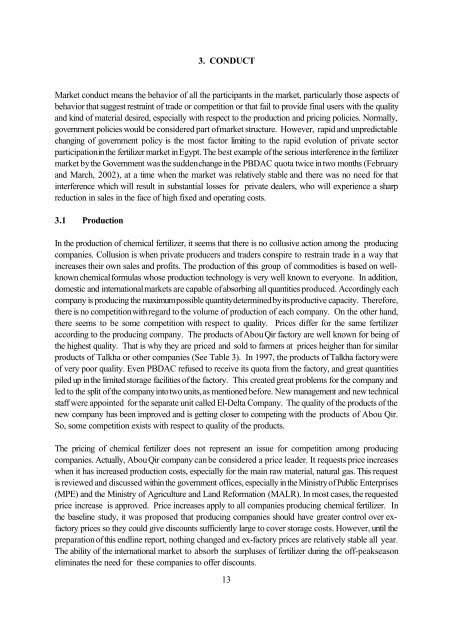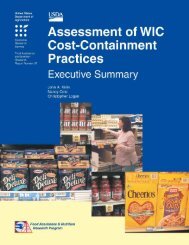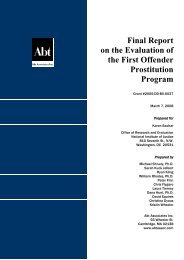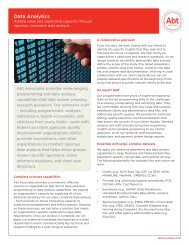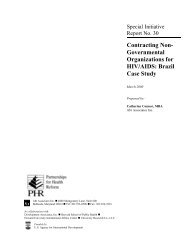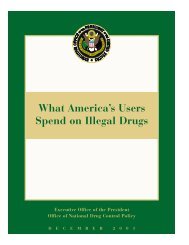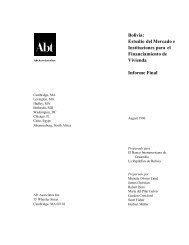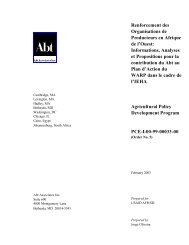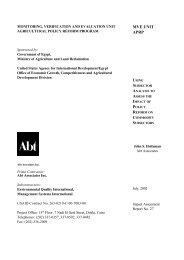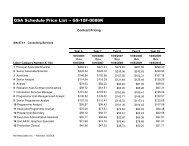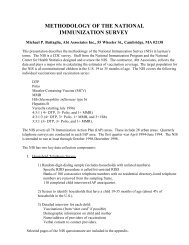Fertilizer Production And Marketing In Egypt ... - Abt Associates
Fertilizer Production And Marketing In Egypt ... - Abt Associates
Fertilizer Production And Marketing In Egypt ... - Abt Associates
Create successful ePaper yourself
Turn your PDF publications into a flip-book with our unique Google optimized e-Paper software.
3. CONDUCT<br />
Market conduct means the behavior of all the participants in the market, particularly those aspects of<br />
behavior that suggest restraint of trade or competition or that fail to provide final users with the quality<br />
and kind of material desired, especially with respect to the production and pricing policies. Normally,<br />
government policies would be considered part of market structure. However, rapid and unpredictable<br />
changing of government policy is the most factor limiting to the rapid evolution of private sector<br />
participation in the fertilizer market in <strong>Egypt</strong>. The best example of the serious interference in the fertilizer<br />
market by the Government was the sudden change in the PBDAC quota twice in two months (February<br />
and March, 2002), at a time when the market was relatively stable and there was no need for that<br />
interference which will result in substantial losses for private dealers, who will experience a sharp<br />
reduction in sales in the face of high fixed and operating costs.<br />
3.1 <strong>Production</strong><br />
<strong>In</strong> the production of chemical fertilizer, it seems that there is no collusive action among the producing<br />
companies. Collusion is when private producers and traders conspire to restrain trade in a way that<br />
increases their own sales and profits. The production of this group of commodities is based on wellknown<br />
chemical formulas whose production technology is very well known to everyone. <strong>In</strong> addition,<br />
domestic and international markets are capable of absorbing all quantities produced. Accordingly each<br />
company is producing the maximum possible quantity determined by its productive capacity. Therefore,<br />
there is no competition with regard to the volume of production of each company. On the other hand,<br />
there seems to be some competition with respect to quality. Prices differ for the same fertilizer<br />
according to the producing company. The products of Abou Qir factory are well known for being of<br />
the highest quality. That is why they are priced and sold to farmers at prices heigher than for similar<br />
products of Talkha or other companies (See Table 3). <strong>In</strong> 1997, the products of Talkha factory were<br />
of very poor quality. Even PBDAC refused to receive its quota from the factory, and great quantities<br />
piled up in the limited storage facilities of the factory. This created great problems for the company and<br />
led to the split of the company into two units, as mentioned before. New management and new technical<br />
staff were appointed for the separate unit called El-Delta Company. The quality of the products of the<br />
new company has been improved and is getting closer to competing with the products of Abou Qir.<br />
So, some competition exists with respect to quality of the products.<br />
The pricing of chemical fertilizer does not represent an issue for competition among producing<br />
companies. Actually, Abou Qir company can be considered a price leader. It requests price increases<br />
when it has increased production costs, especially for the main raw material, natural gas. This request<br />
is reviewed and discussed within the government offices, especially in the Ministry of Public Enterprises<br />
(MPE) and the Ministry of Agriculture and Land Reformation (MALR). <strong>In</strong> most cases, the requested<br />
price increase is approved. Price increases apply to all companies producing chemical fertilizer. <strong>In</strong><br />
the baseline study, it was proposed that producing companies should have greater control over exfactory<br />
prices so they could give discounts sufficiently large to cover storage costs. However, until the<br />
preparation of this endline report, nothing changed and ex-factory prices are relatively stable all year.<br />
The ability of the international market to absorb the surpluses of fertilizer during the off-peakseason<br />
eliminates the need for these companies to offer discounts.<br />
13


